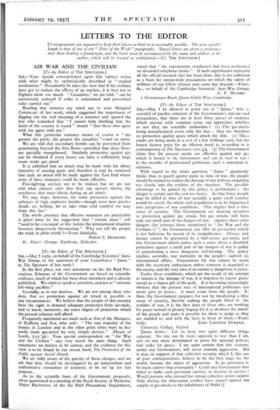AIR WAR AND THE CIVILIAN
LETTERS TO THE EDITOR
[Correspondents are requested to keep their letters as brief as is reasonably possible. The most suitabb length is that of one of our "News of the Week" paragraphs. Signed letters are given a preference over those bearing a pseudonym, and the latter must be accompanied by the name and address of the author, which will be treated as confidential.—Ed. THE SPECTATOR.] [To the Editor of THE SPECTATOR.] SIR,—Your special correspondent upon this subject writes with what might be optimistically described as "studied moderation." Presumably he takes the view that if the civilians have got to endure the effects of air warfare, it is best not to frighten them too much. "Casualties," we are told, "can be enormously reduced if order is maintained and prescribed rules carried out."
Reading that sentence my mind ran to your Marginal Comments of last week, which suggested the importance of digging out the real meaning of a sentence and quoted the boy who remarked that "I cannot help thinking that the heart of the country is sound" meant "that those who agree with me agree with me."
What this particular sentence means of course is "the greater the panic, the greater the casualties "—and no more.
We are told that incendiary bombs can be prevented from penetrating beyond the first floors—provided that these floors are specially strengthened. Similarly protection against gas can be obtained if every house can have a sufficiently large room made gas proof.
It is admitted that an attack may be made with the direct intention of causing panic and therefore it may be surmised that such an attack will be made against the East End where none of these measures could be made effective.
Fire-fighting services are to be trained but we are not told what chances exist that they can operate during the conditions that must obtain during an air attack.
We may hope, however, for some protection against the splinters of high explosive bombs—though even here precise details are lacking, let us take what cold comfort we may from this fact !
The whole pretence that effective measures are practicable is given away by the suggestion that "certain areas" will "need to be evacuated en bloc before the international situation becomes dangerously threatening." Why not tell the people the truth in plain words ?—Yours faithfully,
PHILIP S. MUMFORD.
St. Mary's Grange, Easthorpe, Kelvedon.














































 Previous page
Previous page